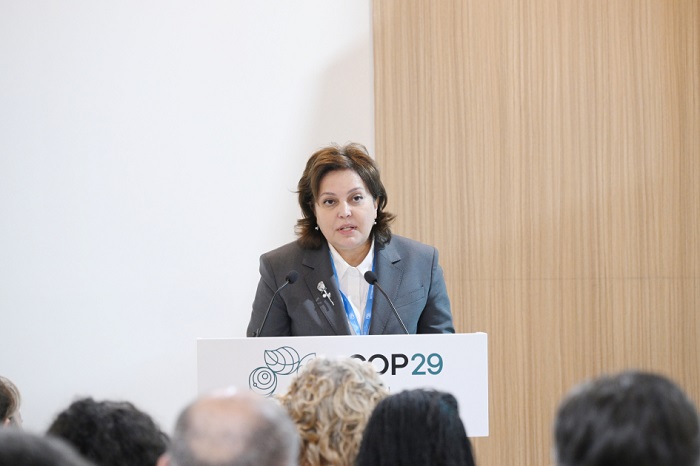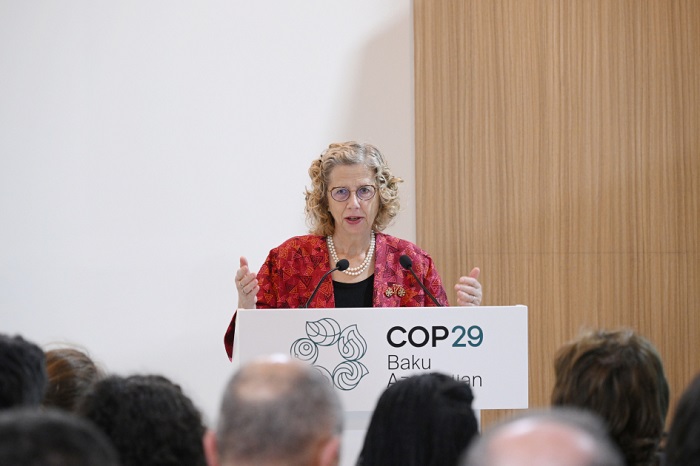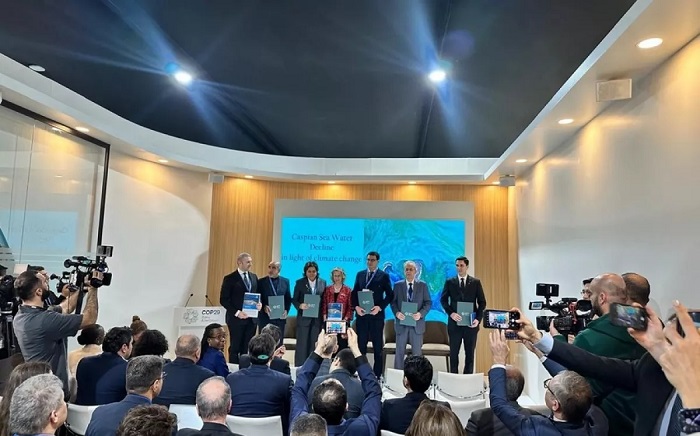At the 29th session of the Conference of the Parties to the United Nations Framework Convention on Climate Change (COP29), officials of the Caspian littoral countries met at the national pavilion of Azerbaijan to discuss the problem of Caspian Sea’s declining water level in the context of climate change.
The meeting, organized by Azerbaijan’s Ministry of Ecology and Natural Resources and the Caspian Sea Environment Protection Convention Secretariat, aimed to address the impact of climate change on the region’s vital water body.
The event brought together representatives of Azerbaijan, Iran, Kazakhstan, Russia and Turkmenistan. The meeting was also attended by the Executive Director of the United Nations Environment Programme (UNEP) Inger Andersen and representatives of other international organizations.
 Deputy Minister of Ecology and Natural Resources of Azerbaijan Umaira Tagieva stressed the importance of regional cooperation to solve the problem. She noted that the decrease in the level of the Caspian Sea in recent years, caused by climate change, poses a serious threat to the ecosystem of this unique reservoir. Tagieva called for joint efforts of experts from the Caspian littoral countries to comprehensively study the problem and develop adaptation measures.
Deputy Minister of Ecology and Natural Resources of Azerbaijan Umaira Tagieva stressed the importance of regional cooperation to solve the problem. She noted that the decrease in the level of the Caspian Sea in recent years, caused by climate change, poses a serious threat to the ecosystem of this unique reservoir. Tagieva called for joint efforts of experts from the Caspian littoral countries to comprehensively study the problem and develop adaptation measures.
Inger Andersen presented the report “Fluctuations in the Caspian Sea level and climate change”, prepared jointly by the Ministry of Ecology and Natural Resources of Azerbaijan and UNEP. In her speech, she called the Caspian Sea a region of ecological, economic and cultural importance that resonates far beyond its shores.
Andersen stressed that the Caspian Sea, the largest enclosed body of water on Earth, is under siege from the triple planetary crisis: the crisis of climate change, the crisis of nature, land and biodiversity loss, and the crisis of pollution and waste.
 By the end of this century, the Caspian Sea’s water levels could plummet by up to 18 meters. This is more than an environmental crisis. It is a human crisis. Such a decline would devastate ecosystems and species, threaten livelihoods and harm food security and stability across the region, she said.
By the end of this century, the Caspian Sea’s water levels could plummet by up to 18 meters. This is more than an environmental crisis. It is a human crisis. Such a decline would devastate ecosystems and species, threaten livelihoods and harm food security and stability across the region, she said.
Andersen warned that without urgent measures, including global action to reduce greenhouse gas emissions, about five million people may be forced to leave the Caspian Basin by the middle of the century.
Andersen cited the decline of fisheries, soil salinization threatening agriculture, and the Caspian seal, which is on the verge of extinction, as examples of the consequences of the decline in the Caspian Sea.
However, she also noted that the situation with the Caspian Sea is not only a story of decline, but also a story of opportunity. She called on countries to unite to protect the reservoir and the species it supports.
Andersen identified three key priorities for solving the problem:
• The need to anchor our responses in science. Robust monitoring and predictive models are essential to understand and manage the drivers of water level changes. Science must inform every decision we take, whether on climate adaptation, biodiversity protection or pollution control.
• Strengthening regional cooperation – The challenges the Caspian faces transcend borders. Solutions must do the same. Through transboundary collaboration, we can craft integrated solutions that safeguard ecosystems, support livelihoods and promote equitable economic growth.
• Urgent and ambitious actions
The World Bank (WB) also expressed its readiness to support the Caspian littoral countries in mitigating the negative effects of the decline in the Caspian Sea level.
 The World Bank’s Regional Director for the South Caucasus, Rolande Pryce, said that the decrease in sea level is already having a negative impact on the economies of coastal countries. For example, some ships can only be loaded to 50% of their capacity, and part of the port infrastructure has become unusable.
The World Bank’s Regional Director for the South Caucasus, Rolande Pryce, said that the decrease in sea level is already having a negative impact on the economies of coastal countries. For example, some ships can only be loaded to 50% of their capacity, and part of the port infrastructure has become unusable.
Pryce believes that the key point for the region is to create a monitoring mechanism that will allow the countries of the Caspian Sea to take interim actions to mitigate and adapt to water levels in this water basin.
The World Bank and UNEP are working on a new project aimed at strengthening the capacity of the Caspian littoral countries to preserve the biodiversity of the Caspian Sea. The project is expected to be approved in July 2025 and aims to help countries manage pollution and improve biodiversity conservation. The project will support the three countries – Azerbaijan, Kazakhstan and Turkmenistan – in developing new pollution monitoring protocols and methods, as well as in identifying new coastal marine protected areas.
 Within the framework of the meeting, the declaration of the Caspian littoral states on strengthening cooperation on measures to respond to the decrease in water levels in the Caspian Sea was adopted. ///nCa, 19 November 2024 [photo credit – Azertag]
Within the framework of the meeting, the declaration of the Caspian littoral states on strengthening cooperation on measures to respond to the decrease in water levels in the Caspian Sea was adopted. ///nCa, 19 November 2024 [photo credit – Azertag]